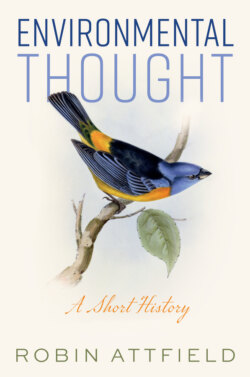Читать книгу Environmental Thought - Robin Attfield - Страница 12
Plato and later Platonism
ОглавлениеMost of the philosopher Plato’s writings are in the form of dialogues, and so it is not always easy to discover which participants of a given dialogue Plato (428/427–348/347 BCE) himself supported (not even his central character Socrates). It is clear, however, that his characters appreciated natural beauty (Phaedrus, 30b), and that they were aware of some (what we call) environmental problems such as soil erosion and deforestation. Thus at Critias 111b–d, he writes about Attica (the region around Athens): ‘There are remaining only the bones of the wasted body, as they may be called … all the richer and softer parts of the soil having fallen away, and the mere skeleton of the land being left’ (Passmore 1974: 175; John Passmore was a leading philosopher and historian of ideas, based in Australia). But it is less clear that he felt any need to take steps to preserve or restore the landscape, since for Plato reality consisted in universal forms (such as justice itself or goodness itself) and not in particular objects or places (Hargrove 1989: 16–26), which are mere shadows of what is real. Besides, none of the Greeks (with the possible exception of Theophrastus, discussed in the next section) were aware of humanly caused environmental problems as such.
However, in Plato’s Phaedrus the claim is made that ‘it is everywhere the responsibility of the animate to look after the inanimate’, one of the foundation texts for belief in the human stewardship of nature (Phaedrus, 246b; Passmore 1974: 28). Some of the subsequent Platonists, such as Iamblichus, interpreted passages like this to mean that humans were sent to live on Earth by God ‘to administer earthly things’ and to care for them in God’s name (Passmore 1974: 28). Passmore took the view that this approach did not appear in Christian teaching until the seventeenth century (1974: 29–30); some evidence for a different interpretation will be advanced in the section on biblical and Christian attitudes.
But the Platonic dialogue that has proved most influential has been Timaeus, with its claim that the world is a living creature (Timaeus, 30c), and with Plato’s account of its ordering by the Demiurge, or cosmic architect (Timaeus, 29a). These themes were later taken up by Renaissance Platonists such as Paracelsus (1493/4–1541) and others, who maintained that the universe was to be viewed ‘as a vast organism, everywhere quick and vital, its body, soul and spirit … held tightly together’ (Merchant 1990 [1980]: 104; Whitney 2006: 40). They also contributed to the later (widely influential) belief in the balance of nature (Egerton 2012: 3).
These perspectives can also be understood as contributory factors in the eventual development during the twentieth century of holistic environmental theories of the Earth (see Chapter 8), such as the Gaia theory of James Lovelock (1979), the holistic ethic of Aldo Leopold (1966 [1949]), the holistic views of Deep Ecologists (Naess 1973) and those of eco-holists such as J. Baird Callicott. Callicott also sought at one stage to appeal to and reinterpret Plato’s ethical holism, in which the good of the whole is what matters, rather than the good or the suffering of the individual, in support of Leopold’s ‘land ethic’ (Republic, 462a–d; Callicott 1980), but he later retracted these claims. The goddess Gaia is actually mentioned passingly in Plato’s Timaeus (Goldin 1997: 198); maybe this was known to the novelist William Golding, who suggested this name to Lovelock to epitomize his theory of the Earth as a self-regulating superorganism.
According to Alfred North Whitehead, ‘The safest general characterization of the European philosophical tradition is that it consists of a series of footnotes to Plato’ (1979 [1929]: 39). This claim has proved more than controversial, even construed strictly about European philosophy. Yet if someone were to apply it to environmental thought, while their claim could be seen as even more controversial, it would not be obvious that they would be wrong. However, another view is possible: the critical insights and the curiosity of the early Greek philosophers (including Empedocles), of historians such as Herodotus (who discusses the distinctive reproductive capacities of hares), of Hippocrates and of Plato himself, derive much of their importance from their supplying the foundations for the original studies of Aristotle and Theophrastus, the founders of several disciplines including biology (Egerton 2012: 4).
